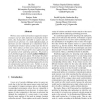Free Online Productivity Tools
i2Speak
i2Symbol
i2OCR
iTex2Img
iWeb2Print
iWeb2Shot
i2Type
iPdf2Split
iPdf2Merge
i2Bopomofo
i2Arabic
i2Style
i2Image
i2PDF
iLatex2Rtf
Sci2ools
135
click to vote
ACSAC
2007
IEEE
2007
IEEE
Efficient Distributed Detection of Node Replication Attacks in Sensor Networks
Wireless sensor nodes lack hardware support for tamperresistance and are often deployed in unattended environments, thus leaving them vulnerable to capture and compromise by an adversary. In a node replication attack, an adversary uses the credentials of a compromised node to surreptitiously introduce replicas of that node into the network. These replicas are then used to launch a variety of attacks that subvert the goal of the sensor application, and the operation of the underlying protocols. We present a novel distributed approach called Localized Multicast for detecting node replication attacks. We evaluate the performance and security of our approach both theoretically and via simulation. Our results show that Localized Multicast is more efficient than previous distributed approaches in terms of communication and memory costs. Further, in our approach, the probability of detecting node replicas is much higher than that achieved in previous distributed protocols.
Related Content
| Added | 12 Aug 2010 |
| Updated | 12 Aug 2010 |
| Type | Conference |
| Year | 2007 |
| Where | ACSAC |
| Authors | Bo Zhu, Venkata Gopala Krishna Addada, Sanjeev Setia, Sushil Jajodia, Sankardas Roy |
Comments (0)

